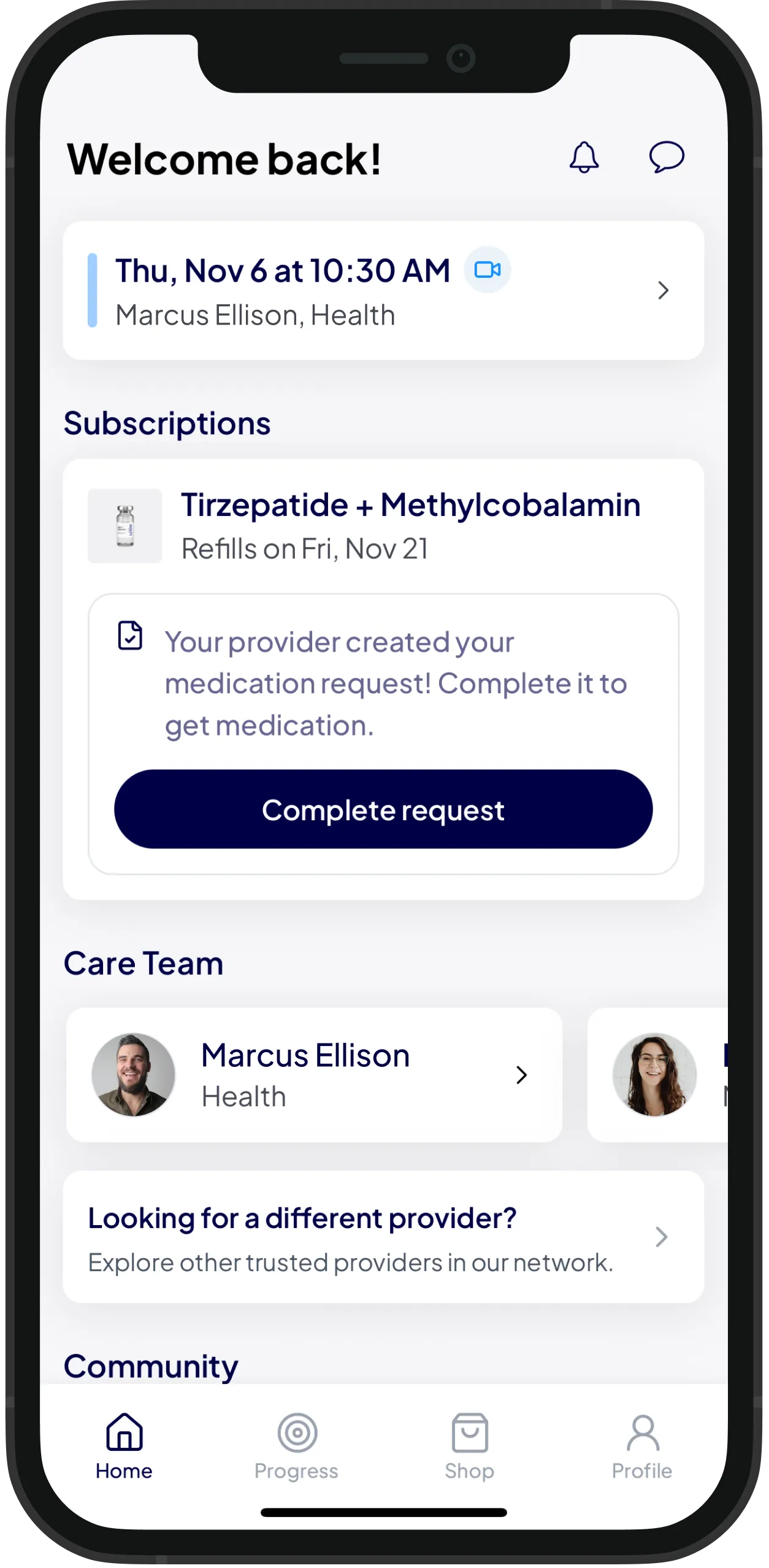Ready to transform your health?
Unlock access to expert guidance and a weight care plan crafted just for you.
Ready to transform your health?
Unlock access to expert guidance and a weight care plan crafted just for you.
Similar Articles
Similar Articles


GLP-1s for Pre-diabetes: Can You Prevent Type II Diabetes?
GLP-1s for Pre-diabetes: Can You Prevent Type II Diabetes?


Is Long-Term GLP-1 Use Safe? What 10-Year Data Suggests
Is Long-Term GLP-1 Use Safe? What 10-Year Data Suggests


GLP 1s and Cardiometabolic Health: How These Medications Support the Heart and Long Term Wellness
GLP 1s and Cardiometabolic Health: How These Medications Support the Heart and Long Term Wellness
Compounded medication
Compounded medication
Compounded medication
Updated on
Updated on
Updated on
Oct 23, 2024
Oct 23, 2024
Oct 23, 2024
Best Medications For Obesity
Best Medications For Obesity
Best Medications For Obesity
If you are struggling to lose weight and manage a concurrent medical condition, then there may be medications available that can treat your condition and help you lose weight.
If you are struggling to lose weight and manage a concurrent medical condition, then there may be medications available that can treat your condition and help you lose weight.
If you are struggling to lose weight and manage a concurrent medical condition, then there may be medications available that can treat your condition and help you lose weight.



Table of Contents
Table of Contents
Table of Contents
References
References
References
Two Birds With One Stone
Obesity is a chronic condition that affects a significant portion of the global population. It is characterized by excessive body fat that can lead to a variety of health problems, including heart disease, diabetes, and stroke. Most people may be struggling with obesity and other medical conditions such as heart disease, diabetes, anxiety/depression, etc. This creates a vicious cycle of obesity causing or worsening a disease that you have, then that disease preventing you from doing what you need to do to manage the obesity. This can be extremely frustrating and may even seem hopeless.
There are several types of medications available for obesity, including appetite suppressants, lipase inhibitors, and combination medications. These drugs work in various ways to help reduce weight, such as reducing appetite, blocking the absorption of fat, and increasing the feeling of fullness.
But before jumping to specific weight loss medications, there may be medications that can manage your obesity as well as a concurrent condition you may be managing. Below are a few examples of medications used to treat specific medical conditions that also have benefits for managing obesity:

Benefits of GLP-1 Medications
You may have seen that GLP-1 agonists have shown up multiple times in the table above or even in your searches for the best medications for treating obesity. I promise you that this is not a product plug! It is just the data!
More and more studies are being published about the multiple benefits of GLP-1 agonists on different conditions such as cardiovascular health, obesity, type 2 diabetes, polycystic ovarian syndrome, and even anxiety and depression. There are even early preclinical studies showing that there may be a benefit for osteoarthritis (2)! The FDA has even approved certain GLP-1 agonists specifically for weight loss and managing obesity. As more data become available, we may see these types of medications being used for a large variety of medical conditions.
If you would like to learn more about GLP-1 medications or want to see if you might be eligible for medication-assisted weight loss, check out Mochi Health, where board-certified obesity medicine physicians can offer expertise in this realm!
Conclusion
If you are struggling to lose weight while managing other medical conditions you may have, then there may be medications that can kill two birds with one stone. There are a plethora of medications for different medical conditions that have weight loss benefits that could be added to your treatment plan. Among them, GLP-1 agonists like Wegovy®, Ozempic®, and Mounjaro® are becoming more popular for multiple different medical conditions due to their weight loss benefits and overall effect on those conditions.
It is also important to remember that, like most weight loss regimens, medication alone is not the best approach to weight loss. To sustain and obtain successful weight loss, it must be a combination of dieting, regular exercise, medication if needed, and regular follow-up with a provider or dietician. If you do not wish to start specific weight loss medications, then there are options for medications for any medical condition you are currently treating that may also help you lose weight.
Sources
Pozzi M, Mazhar F, Peeters GGAM, Vantaggiato C, Nobile M, Clementi E, Radice S, Carnovale C. A systematic review of the antidepressant effects of glucagon-like peptide 1 (GLP-1) functional agonists: Further link between metabolism and psychopathology: Special Section on "Translational and Neuroscience Studies in Affective Disorders". Section Editor, Maria Nobile MD, Ph.D. This Section of JAD focuses on the relevance of translational and neuroscience studies in providing a better understanding of the neural basis of affective disorders. The main aim is to briefly summarize relevant research findings in clinical neuroscience with particular regard to specific innovative topics in mood and anxiety disorders. J Affect Disord. 2019 Oct 1;257:S0165-0327(19)30593-2. doi: 10.1016/j.jad.2019.05.044. Epub 2019 May 28. PMID: 31153593.\
Meurot C, Martin C, Sudre L, Breton J, Bougault C, Rattenbach R, Bismuth K, Jacques C, Berenbaum F. Liraglutide, a glucagon-like peptide 1 receptor agonist, exerts analgesic, anti-inflammatory and anti-degradative actions in osteoarthritis. Sci Rep. 2022 Jan 28;12(1):1567. doi: 10.1038/s41598-022-05323-7. PMID: 35091584; PMCID: PMC8799666.
Two Birds With One Stone
Obesity is a chronic condition that affects a significant portion of the global population. It is characterized by excessive body fat that can lead to a variety of health problems, including heart disease, diabetes, and stroke. Most people may be struggling with obesity and other medical conditions such as heart disease, diabetes, anxiety/depression, etc. This creates a vicious cycle of obesity causing or worsening a disease that you have, then that disease preventing you from doing what you need to do to manage the obesity. This can be extremely frustrating and may even seem hopeless.
There are several types of medications available for obesity, including appetite suppressants, lipase inhibitors, and combination medications. These drugs work in various ways to help reduce weight, such as reducing appetite, blocking the absorption of fat, and increasing the feeling of fullness.
But before jumping to specific weight loss medications, there may be medications that can manage your obesity as well as a concurrent condition you may be managing. Below are a few examples of medications used to treat specific medical conditions that also have benefits for managing obesity:

Benefits of GLP-1 Medications
You may have seen that GLP-1 agonists have shown up multiple times in the table above or even in your searches for the best medications for treating obesity. I promise you that this is not a product plug! It is just the data!
More and more studies are being published about the multiple benefits of GLP-1 agonists on different conditions such as cardiovascular health, obesity, type 2 diabetes, polycystic ovarian syndrome, and even anxiety and depression. There are even early preclinical studies showing that there may be a benefit for osteoarthritis (2)! The FDA has even approved certain GLP-1 agonists specifically for weight loss and managing obesity. As more data become available, we may see these types of medications being used for a large variety of medical conditions.
If you would like to learn more about GLP-1 medications or want to see if you might be eligible for medication-assisted weight loss, check out Mochi Health, where board-certified obesity medicine physicians can offer expertise in this realm!
Conclusion
If you are struggling to lose weight while managing other medical conditions you may have, then there may be medications that can kill two birds with one stone. There are a plethora of medications for different medical conditions that have weight loss benefits that could be added to your treatment plan. Among them, GLP-1 agonists like Wegovy®, Ozempic®, and Mounjaro® are becoming more popular for multiple different medical conditions due to their weight loss benefits and overall effect on those conditions.
It is also important to remember that, like most weight loss regimens, medication alone is not the best approach to weight loss. To sustain and obtain successful weight loss, it must be a combination of dieting, regular exercise, medication if needed, and regular follow-up with a provider or dietician. If you do not wish to start specific weight loss medications, then there are options for medications for any medical condition you are currently treating that may also help you lose weight.
Sources
Pozzi M, Mazhar F, Peeters GGAM, Vantaggiato C, Nobile M, Clementi E, Radice S, Carnovale C. A systematic review of the antidepressant effects of glucagon-like peptide 1 (GLP-1) functional agonists: Further link between metabolism and psychopathology: Special Section on "Translational and Neuroscience Studies in Affective Disorders". Section Editor, Maria Nobile MD, Ph.D. This Section of JAD focuses on the relevance of translational and neuroscience studies in providing a better understanding of the neural basis of affective disorders. The main aim is to briefly summarize relevant research findings in clinical neuroscience with particular regard to specific innovative topics in mood and anxiety disorders. J Affect Disord. 2019 Oct 1;257:S0165-0327(19)30593-2. doi: 10.1016/j.jad.2019.05.044. Epub 2019 May 28. PMID: 31153593.\
Meurot C, Martin C, Sudre L, Breton J, Bougault C, Rattenbach R, Bismuth K, Jacques C, Berenbaum F. Liraglutide, a glucagon-like peptide 1 receptor agonist, exerts analgesic, anti-inflammatory and anti-degradative actions in osteoarthritis. Sci Rep. 2022 Jan 28;12(1):1567. doi: 10.1038/s41598-022-05323-7. PMID: 35091584; PMCID: PMC8799666.
Two Birds With One Stone
Obesity is a chronic condition that affects a significant portion of the global population. It is characterized by excessive body fat that can lead to a variety of health problems, including heart disease, diabetes, and stroke. Most people may be struggling with obesity and other medical conditions such as heart disease, diabetes, anxiety/depression, etc. This creates a vicious cycle of obesity causing or worsening a disease that you have, then that disease preventing you from doing what you need to do to manage the obesity. This can be extremely frustrating and may even seem hopeless.
There are several types of medications available for obesity, including appetite suppressants, lipase inhibitors, and combination medications. These drugs work in various ways to help reduce weight, such as reducing appetite, blocking the absorption of fat, and increasing the feeling of fullness.
But before jumping to specific weight loss medications, there may be medications that can manage your obesity as well as a concurrent condition you may be managing. Below are a few examples of medications used to treat specific medical conditions that also have benefits for managing obesity:

Benefits of GLP-1 Medications
You may have seen that GLP-1 agonists have shown up multiple times in the table above or even in your searches for the best medications for treating obesity. I promise you that this is not a product plug! It is just the data!
More and more studies are being published about the multiple benefits of GLP-1 agonists on different conditions such as cardiovascular health, obesity, type 2 diabetes, polycystic ovarian syndrome, and even anxiety and depression. There are even early preclinical studies showing that there may be a benefit for osteoarthritis (2)! The FDA has even approved certain GLP-1 agonists specifically for weight loss and managing obesity. As more data become available, we may see these types of medications being used for a large variety of medical conditions.
If you would like to learn more about GLP-1 medications or want to see if you might be eligible for medication-assisted weight loss, check out Mochi Health, where board-certified obesity medicine physicians can offer expertise in this realm!
Conclusion
If you are struggling to lose weight while managing other medical conditions you may have, then there may be medications that can kill two birds with one stone. There are a plethora of medications for different medical conditions that have weight loss benefits that could be added to your treatment plan. Among them, GLP-1 agonists like Wegovy®, Ozempic®, and Mounjaro® are becoming more popular for multiple different medical conditions due to their weight loss benefits and overall effect on those conditions.
It is also important to remember that, like most weight loss regimens, medication alone is not the best approach to weight loss. To sustain and obtain successful weight loss, it must be a combination of dieting, regular exercise, medication if needed, and regular follow-up with a provider or dietician. If you do not wish to start specific weight loss medications, then there are options for medications for any medical condition you are currently treating that may also help you lose weight.
Sources
Pozzi M, Mazhar F, Peeters GGAM, Vantaggiato C, Nobile M, Clementi E, Radice S, Carnovale C. A systematic review of the antidepressant effects of glucagon-like peptide 1 (GLP-1) functional agonists: Further link between metabolism and psychopathology: Special Section on "Translational and Neuroscience Studies in Affective Disorders". Section Editor, Maria Nobile MD, Ph.D. This Section of JAD focuses on the relevance of translational and neuroscience studies in providing a better understanding of the neural basis of affective disorders. The main aim is to briefly summarize relevant research findings in clinical neuroscience with particular regard to specific innovative topics in mood and anxiety disorders. J Affect Disord. 2019 Oct 1;257:S0165-0327(19)30593-2. doi: 10.1016/j.jad.2019.05.044. Epub 2019 May 28. PMID: 31153593.\
Meurot C, Martin C, Sudre L, Breton J, Bougault C, Rattenbach R, Bismuth K, Jacques C, Berenbaum F. Liraglutide, a glucagon-like peptide 1 receptor agonist, exerts analgesic, anti-inflammatory and anti-degradative actions in osteoarthritis. Sci Rep. 2022 Jan 28;12(1):1567. doi: 10.1038/s41598-022-05323-7. PMID: 35091584; PMCID: PMC8799666.
Read next
Ready to transform your health?
Unlock access to expert guidance and a weight care plan crafted just for you.

Ready to transform your health?
Unlock access to expert guidance and a weight care plan crafted just for you.

Ready to transform your health?
Unlock access to expert guidance and a weight care plan crafted just for you.


© 2026 Mochi Health
All professional medical services are provided by licensed physicians and clinicians affiliated with independently owned and operated professional practices. Mochi Health Corp. provides administrative and technology services to affiliated medical practices it supports, and does not provide any professional medical services itself.


© 2026 Mochi Health
All professional medical services are provided by licensed physicians and clinicians affiliated with independently owned and operated professional practices. Mochi Health Corp. provides administrative and technology services to affiliated medical practices it supports, and does not provide any professional medical services itself.


© 2026 Mochi Health
All professional medical services are provided by licensed physicians and clinicians affiliated with independently owned and operated professional practices. Mochi Health Corp. provides administrative and technology services to affiliated medical practices it supports, and does not provide any professional medical services itself.
















